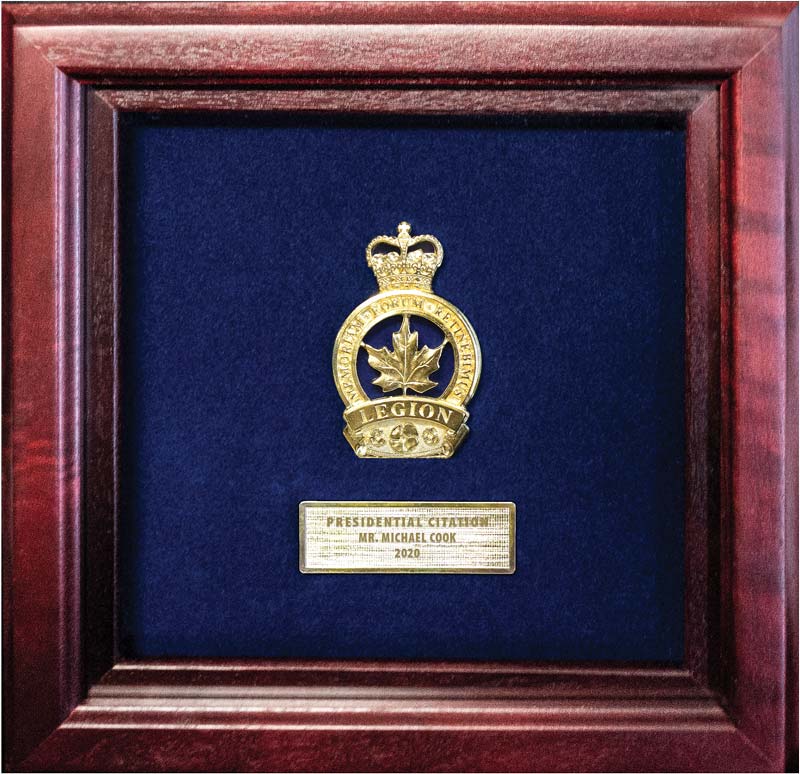At its meeting via video conference on April 24-25, Dominion Executive Council (DEC) considered the many impacts of COVID-19 on The Royal Canadian Legion in recent months. A common theme through the meeting was how the Legion has responded to the pandemic and its plans for a post-pandemic future.
“Branches stepped up to the plate to offer their spaces for vaccination and testing.”
“A top priority of the RCL in the past year has been to help many branches, in serious financial difficulty because of the lockdowns, avoid permanent closure,” said Grand President Larry Murray. “Dominion Command initially provided relief using national reserves to the extent feasible and then successfully sought assistance from government for the first time in the Legion’s nearly 100-year history. The support focused strictly on branch survival.”
“We have managed to quickly and efficiently ensure the branches applying for federal support have received financial help,” said Dominion President Tom Irvine. “Branches stepped up to the plate to offer their spaces for vaccination and testing. And branches have continued to innovate to offer services, invite and renew members, and promote remembrance.”
In April 2020, DEC announced it would release up to $3 million in Branch Emergency Funds from the national reserves to help branches struggling financially during the pandemic. Almost $2.5 million in non-repayable grants had been disbursed to date.
On Nov. 10, 2020, Veterans Affairs Canada announced the $20-million Veterans Organizations Emergency Support Fund. The RCL was allocated $14 million to distribute to Legion branches struggling with operational costs as a direct result of COVID-19. The funds were disbursed on Dec. 21 ($7.2 million to 701 branches), March 1 ($2.8 million to 282 branches) and May 7 (remaining funds to 885 branches). Provincial command offices were eligible to apply for the third phase of the fund.
Dominion Treasurer Mark Barham reported that Dominion Command ended 2020 with an operating surplus of $1,310,917. (The 2019 surplus was $135,077.) Investment returns were $403,195 in 2020, $138,507 less than budgeted. Market volatility and the drawdown of reserve funds for the $3 million Branch Emergency Fund explain the variance. The Supply Department finished the year with $4,007,152 in sales, surpassing revenue expectations by $1.4 million. The sale of Legion face masks brought in the majority of this surplus.
RCL committee expenses were 90 per cent below budget, due to travel and event cancellations: member sports were $347,991 under budget and track and field was $259,099 under budget. Member Services expenses exceeded budget by $60,240, due largely to increases in credit card and mail processing fees and extended hours of operation.
DEC gave the go-ahead to produce an electronic membership card, downloadable to mobile devices, to complement the current plastic membership card and stickers.
“The pandemic demonstrated we need new methods to distribute physical cards and stickers,” said Bruce Julian, chair of the Membership Committee. “An e-card would modernize and reduce costs. It is carried on a smart phone app [a “wallet”] that securely holds card information.”
Following its strategic plan to update the membership experience, Member Services has increased branch online participation, improved the online member-renewal process, and allowed new members to join local branches online. In 2020, 76 per cent of memberships were processed online, either by branches or by members themselves. And 6,454 members joined online, compared to 1,456 in 2019.
In the first quarter of 2020, Legion membership was increasing by two per cent year-over-year, Julian reported, but the pandemic put the brakes on that. Total paid membership in 2020 was 248,427, down by 11,770 members (3.5 per cent) compared to 2019.
In view of membership declines due to the pandemic, said Julian, the RCL will have to increase its marketing efforts post-pandemic. To date, the 2021 membership in the Legion was down 26,000 year-over-year.
To build momentum and position the Legion for recovery, an additional $150,000 will be spent on marketing and membership initiatives, including paid social media ads targeting new members, a direct-mail campaign to renew existing members and telemarketing calls to non-renewed members.
Poppy and Remembrance Committee chair Angus Stanfield brought forward an action item to increase the number of “Pay Tribute” tap-enabled donation boxes available in 2021. In last year’s pilot project, 250 boxes were placed in HSBC banks and some Legion branches in Ontario. HSBC pays for the boxes. The goal for 2021 is 2,000.
Stanfield also moved that $599,700 over three years be approved to support the Heroes in Mind Advocacy and Research Consortium, which supports research to benefit the health and well-being of Canadian military, veterans, public safety personnel and their families. Spearheaded by the University of Alberta Faculty of Rehabilitation Medicine, partners include the Legion’s Alberta-Northwest Territories Command, the Northern Alberta Institute of Technology and other like-minded institutions. The motion was approved.
The 2021 dominion convention on Aug. 13-15 will be conducted virtually.
Also approved was $25,000 to Heroes Mending on the Fly Canada, $15,000 to Ways to Wellbeing, and $6,000 to 11 Days of Remembrance.
Sports Committee chair Brian Weaver reported on the 2022 and 2023 schedules for member sports championships (cribbage, darts and eight ball) and the Legion National Youth Track and Field Championships. The committee is seeking branches to host cribbage and darts in 2023.
Convention Committee chair Irvine reported that DEC decided on March 31 that the 2021 dominion convention on Aug. 13-15 will be conducted virtually. This triggered the cancellation of reservations for the convention centre and hotel in Saskatoon. Saskatoon will be offered the opportunity to host the convention in 2028. Saint John, N.B., is scheduled to host in 2024 and Winnipeg in 2026.
“2020 made it clear how resilient members are.”
Plans are underway for the Legion’s 100th anniversary program from June 2025 to July 2026, reported Owen Parkhouse, chair of the Centenary Committee. A special logo has been designed and approved by DEC, and the following institutions have been contacted: Canadian Heraldic Authority for a coat of arms; Royal Canadian Mint for a centenary general circulation coin; Canada Post for a centenary commemorative stamp; and the National Film Board for a documentary on 100 years of the Legion. More planning committee members—at least one member per command—are being recruited.
Dave Flannigan, chair of the Legion National Foundation (LNF), reported that more than $350,000 is being disbursed in 2021 to charitable organizations supporting veterans and their families. The LNF board approved a fundraising strategy that includes a direct-mail campaign, online appeals, a monthly giving program and legacy giving. Its corporate campaign—for national and local businesses alike—is expanding. The Digital Poppy and Remembrance Island campaigns will run from Oct. 29 to Nov. 11, 2021.
Reports by provincial command presidents revealed a common theme: despite the pandemic, the nationwide work of the Legion carries on.
“2020 made it clear how resilient members are,” said John Mahon of Alberta-NWT. “We have strength in numbers, and our priority has been taking care of veterans and the homeless.”
Valerie MacGregor of B.C./Yukon reported that the command’s flagship project, Legion Veterans Village, a 20-storey mixed-use building in North Surrey, B.C., is on schedule. It will include a centre of excellence on mental health for veterans and first responders, a rehabilitation and health centre, housing units and commercial space. The first of two phases is due for completion in late 2022.
Garry Pond of Ontario noted that the 40-apartment Veterans’ House in Ottawa opened its doors to its first residents in February.
Pond cautioned that with Article III complaints in abeyance, it has been “quite stressful, especially to those who have proceedings hanging over their future.” Article III outlines the Legion’s complaints and appeals process. In March 2020, DEC decided all current and new complaints and appeals would be held in abeyance for the duration of the pandemic.
Other presidents echoed the point. “We have lots of Article IIIs, and people are just burnt out,” said Marion Fryday-Cook of Nova Scotia/Nunavut. “These are difficult times,” said MacGregor, “and we need to be calm, kind, and take care of one another.”
Under new business, Nathan Lehr motioned for Dominion Command to produce a letter of support for a Newfoundland and Labrador Command initiative to repatriate the remains of an unknown soldier from the First World War, to be interred at the 100th anniversary rededication of the Newfoundland National War Memorial in St. John’s on July 1, 2024.
“I support this initiative 100 per cent,” said Dominion Immediate Past President Dave Flannigan. The rest of the council agreed.
The meeting concluded with a special presentation by Irvine. Michael Cook, David Sinclair and Gerry Vowles—all past command presidents—were presented with the President’s Citation in honour of their commitment and outstanding service as trustees of B.C./Yukon Command in 2017-19.

[The Royal Canadian Legion]
Advertisement




















